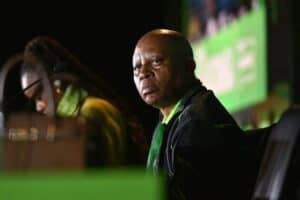The racist and violent EFF is likely to at least double their vote nationally which, with the ANC, could mean a two-thirds majority in parliament.

Voter intentions are notoriously difficult to gauge. Nevertheless, two polls just released give some fascinating possible scenarios, once next week’s votes are counted.
Ipsos did a face-to-face poll between the last week of March and mid-April, with a claimed maximum error margin of two percentage points on either side of their prediction. The Institute of Race Relations (IRR) poll is marginally fresher, conducted in the week running to April 25, with a 2.8% margin of error.
Perhaps the biggest single takeaway, a grim omen for SA’s future, is the vigorous growth of the Economic Freedom Fighters (EFF). In 2014, in their first election, the EFF got 6.4% of the national vote. But Ipsos puts EFF support now at 11%. The IRR predicts around 14-15%, depending on voter turnout.
This means that the racist and violent EFF is likely to at least double their vote nationally. That puts it within striking distance of displacing the Democratic Alliance (DA) as the biggest opposition party and it means that the EFF may provincially hold the balance of power in the Western Cape and Gauteng.
Mari Harris of Ipsos says that EFF is also in the running to be the official opposition in three provinces: Limpopo, North West, and Mpumalanga.
Nationally, Ipsos places the ANC on 61%, which would be only a marginal decline from the 62% it achieved in 2014. In contrast, the IRR believes the ANC majority to be at 50-51%.
Were that the case, the romance developing recently between the ANC and EFF would likely be consummated. Together, they would be nudging a two-thirds majority in parliament, with 64-66% of the vote.
There is less disagreement on the DA’s likely fortunes. Ipsos puts the DA vote at 19% and IRR in the 21-24% range. Such a result would be hugely disappointing for the DA, which got over 22% in 2014.
Given the disarray in ANC ranks, SA’s faltering economy, the growing violence and corruption, this would be a textbook case of a leader snatching defeat from the jaws of victory. It is difficult to see how Mmusi Maimane could survive at the helm.
The IRR research specifically looked at two key provinces, those of Western Cape and Gauteng, using smaller samples and consequently with a higher error margin of 6%.
In the Western Cape, it puts DA support in the 45-51% range, depending on turnout. The ANC has a smaller range of 28-29%. That leaves the African Christian Democratic Party at 7% and the EFF on 5-7%.
Although it is difficult to predict accurately the performance of small parties, the Western Cape minnows seem pretty much moribund. The Good Movement is under 3%. The Freedom Front Plus and the United Democratic Movement are both under 2%.
In Gauteng, the IRR gauges ANC support at 39- 43%, which is substantially down from the 54% it got in 2014. The DA range is 32-40% – and trending upwards – while the EFF vote is surprisingly low at 12-13%, trending downwards. The DA scored 31% of the vote in 2014 and the EFF 10%.
Both polls point to a democracy that is creaking and an electorate that is alienated from its leaders.
William Saunderson-Meyer.
For more news your way, download The Citizen’s app for iOS and Android.
Support Local Journalism
Add The Citizen as a Preferred Source on Google and follow us on Google News to see more of our trusted reporting in Google News and Top Stories.






